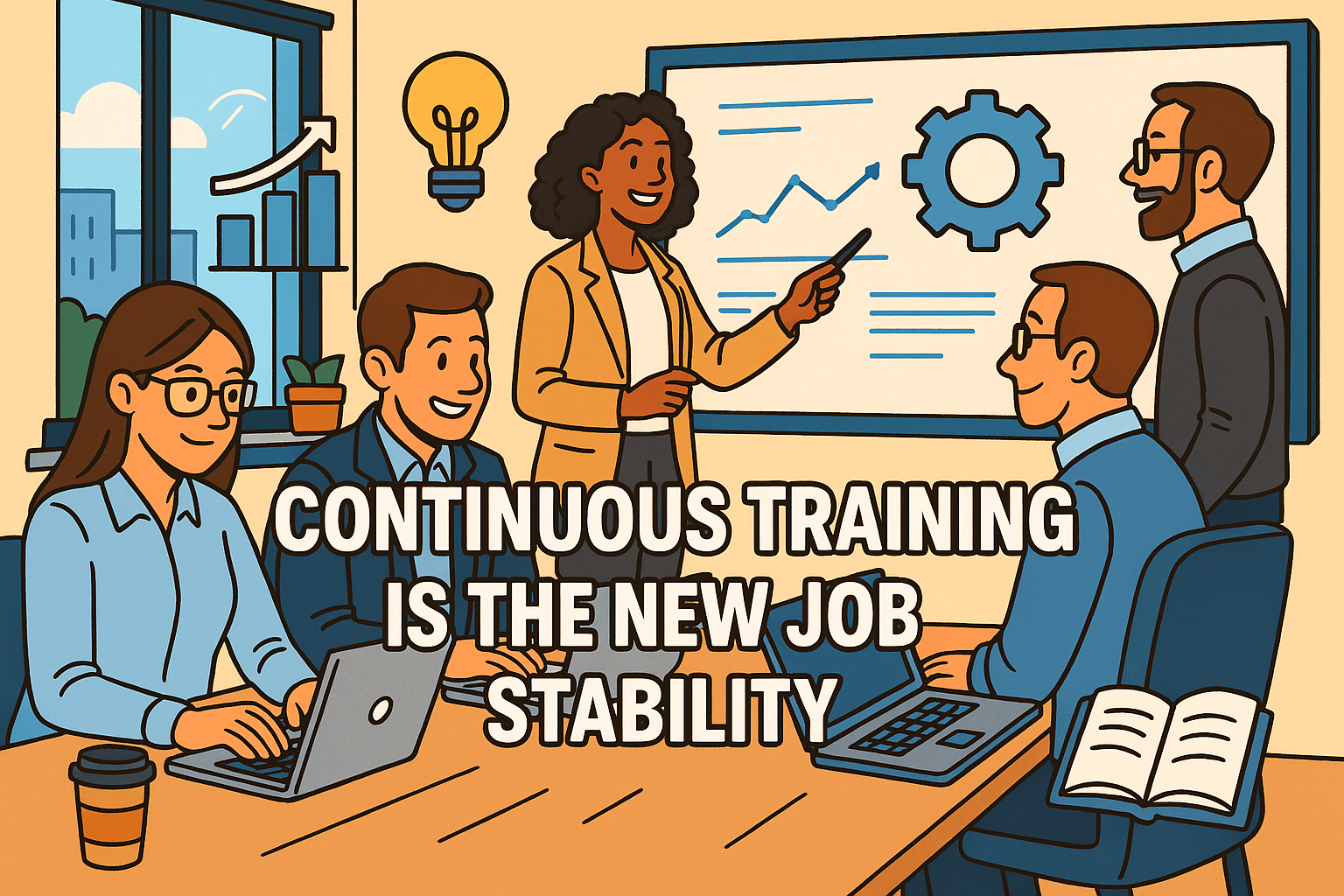In an era where technology evolves faster than job titles, the definition of “job stability” has changed. The days when a single skill set could sustain an entire career are over. Today, continuous training—not tenure—is what keeps professionals relevant, employable, and competitive.
From Lifetime Employment to Lifetime Learning
A generation ago, job security often meant staying loyal to one company for decades. In exchange, employers offered steady paychecks, predictable advancement, and retirement benefits. That model no longer holds.
According to the World Economic Forum’s 2025 Future of Jobs Report, 44% of workers’ skills are expected to change by 2027, with AI and automation driving rapid transformation across industries. This means professionals can’t rely on static expertise—they must continuously learn, adapt, and reskill to stay employable.
The Real Meaning of Job Stability in 2025
Modern job stability isn’t about holding onto one role—it’s about ensuring your skills stay in demand. Companies now value adaptability over seniority, and hiring managers increasingly prioritize candidates who demonstrate learning agility.
A 2024 LinkedIn Workplace Learning Report found that 89% of HR leaders believe “proactive reskilling” is the key to long-term employability. Employees who embrace continuous training are seen as more valuable because they can grow alongside company needs.
In short: stability today comes from being versatile, not static.
Why Continuous Training Works
Future-Proofing Skills
New technologies—from AI and machine learning to green energy—create emerging skill gaps. Continuous training ensures you stay ahead of these shifts, rather than playing catch-up.
Career Agility
A broad, up-to-date skill set gives professionals flexibility to pivot between roles or even industries. When layoffs or restructuring occur, those with recent training are more likely to land new opportunities quickly.
Employer Appeal
Companies favor employees who invest in themselves. Ongoing learning signals initiative, adaptability, and commitment to growth—qualities that make you indispensable even in uncertain times.
Personal Growth and Confidence
Beyond employability, continuous learning fosters curiosity, creativity, and self-confidence. It empowers workers to take ownership of their careers, rather than waiting for external stability.
How to Build a Habit of Continuous Learning
- Set learning goals tied to your career aspirations.
- Leverage employer-provided training or tuition reimbursement programs.
- Use microlearning platforms like Coursera, Udemy, or LinkedIn Learning for flexible education.
- Engage in professional communities to exchange knowledge and stay current.
- Document and showcase new skills on your resume and LinkedIn profile to attract new opportunities.
Job stability isn’t about where you work—it’s about how you grow. Continuous training keeps your skills current, your career adaptable, and your opportunities open. The professionals who thrive in the future will be those who never stop learning.
In today’s dynamic job market, stability comes from skill mobility, not employer loyalty. The ability to learn, unlearn, and relearn ensures that you remain relevant—even as industries transform and new technologies emerge. Whether you’re a seasoned professional or just starting out, making learning part of your routine is your best safeguard against disruption.
Think of continuous training as career insurance: every new certification, online course, or project you complete adds to your professional resilience. Instead of fearing change, you’ll be equipped to navigate it—turning uncertainty into opportunity.
The takeaway is simple but powerful: the most stable careers belong to the most adaptable people.
How Companies Are Redefining Stability Through Learning Culture
Forward-thinking organizations have realized that retaining talent isn’t just about offering higher pay or better perks—it’s about creating a culture of continuous learning. When employees feel empowered to grow, they’re more engaged, more innovative, and more loyal.
According to a 2024 Deloitte Insights report, companies that invest in structured learning programs experience 53% lower employee turnover and 24% higher productivity. These businesses don’t just provide occasional training—they integrate learning into daily workflows through mentorships, cross-functional projects, and accessible learning platforms.
Leading examples include:
- Amazon’s Career Choice Program, which pre-pays tuition for employees seeking new skills—even outside the company’s current needs.
- Google’s “Grow with Google” initiative, offering professional certificates and skill development opportunities to both employees and external learners.
- Siemens’ Digital Academy, which trains staff in digital transformation and AI-driven manufacturing to stay ahead of global industry shifts.
By fostering a culture that celebrates progress over perfection, these companies make learning a shared value. In turn, employees experience a new form of stability—one rooted not in permanence, but in possibility.
FAQ
Q: Is continuous training only important for tech careers?
A: No. Every industry—from healthcare to construction—is evolving. Continuous learning helps workers in all fields adapt to new tools, regulations, and best practices.
Q: How often should I update my skills?
A: Aim to learn something new at least every quarter. Even small steps, like taking a short online course or attending a workshop, can compound over time.
Q: What if my employer doesn’t offer training programs?
A: Take initiative—many affordable online platforms and certifications are self-paced and recognized across industries.

